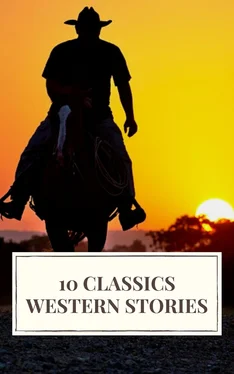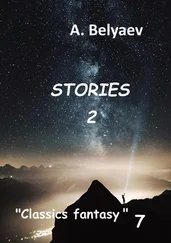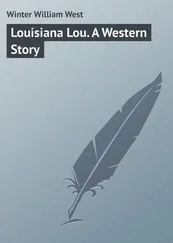Through the shifting wall of the worst blizzard that season Thurston watched the weary, fruitless, endless march of the range. "Where do they all come from?" he exclaimed once when the snow-veil lifted and showed the river black with cattle.
"Lord! I dunno," Gene answered, shrugging his shoulders against the pity of it. "I seen some brands yesterday that I know belongs up in the Cypress Hills country. If things don't loosen up pretty soon, the whole darned range will be swept clean uh stock as far north as cattle run. I'm looking for reindeer next."
"Something ought to be done," Thurston declared uneasily, turning away from the sight. "I've had the bellowing of starving cattle in my ears day and night for nearly a month. The thing's getting on my nerves."
"It's getting on the nerves uh them that own 'em a heap worse," Gene told him grimly, and piled more wood on the fire; for the cold bit through even the thick walls of the cabin when the flames in the fireplace died, and the door hinges were crusted deep with ice. "There's going to be the biggest loss this range has ever known."
"It's the owners' fault," snapped Thurston, whose nerves were in that irritable state which calls loudly for a vent of some sort. Even argument with Gene, fruitless though it perforce must be, would be a relief. "It's their own fault. I don't pity them any—why don't they take care of their stock? If I owned cattle, do you think I'd sit in the house and watch them starve through the winter?"
"What if yuh owned more than yuh could feed? It'd be a case uh have-to then. There's fifty thousand Lazy Eight cattle walking the range somewhere today. How the dickens is old Hank going to feed them fifty thousand? or five thousand? It takes every spear uh hay he's got to feed his calves."
"He could buy hay," Thurston persisted.
"Buy hay for fifty thousand cattle? Where would he get it? Say, Bud, I guess yuh don't realize that's some cattle. All ails you is, yuh don't savvy the size uh the thing. I'll bet yuh there won't be less than three hundred thousand head cross this river before spring."
"Some of them belong in Canada—you said so yourself."
"I know it, but look at all the country south of us: all the other cow States. Why, Bud, when yuh talk about feeding every critter that runs the range, you're plumb foolish."
"Anyway, it's a damnable pity !" Thurston asserted petulantly.
"Sure it is. The grass is there, but it's under fourteen inches uh snow right now, and more coming; they say it's twelve feet deep up in the mountains. You'll see some great old times in the spring, Bud, if yuh stay. You will, won't yuh?"
Thurston laughed shortly. "I suppose it's safe to say I will," he answered. "I ought to have gone last fall, but I didn't. It will probably be the same thing over again; I ought to go in the spring, but I won't."
"You bet you won't. Talk about big roundups! what yuh seen last spring wasn't a commencement. Every hoof that crosses this river and lives till spring will have to be rounded up and brought back again. They'll be scattered clean down to the Yellowstone, and every Northern outfit has got to go down and help work the range from there back. I tell yuh, Bud, yuh want to lay in a car-load uh films and throw away all them little, jerk-water snap-shots yuh got. There's going to be roundups like these old Panhandle rannies tell about, when the green grass comes." Gene, thinking blissfully of the tented life, sprawled his long legs toward the snapping blaze and crooned dreamily, while without the blizzard raged more fiercely, a verse from an old camp song:
"Out on the roundup, boys, I tell yuh what yuh get
Little chunk uh bread and a little chunk uh meat;
Little black coffee, boys, chuck full uh alkali,
Dust in your throat, boys, and gravel in your eye!
So polish up your saddles, oil your slickers and your guns,
For we're bound for Lonesome Prairie when the green grass comes."
One night in late March a sullen, faraway roar awakened Thurston in his bunk. He turned over and listened, wondering what on earth was the matter. More than anything it sounded like a hurrying freight train only the railroad lay many miles to the north, and trains do not run at large over the prairie. Gene snored peacefully an arm's length away. Outside the snow lay deep on the levels, while in the hollows were great, white drifts that at bedtime had glittered frostily in the moonlight. On the hill- tops the gray wolves howled across coulees to their neighbors, and slinking coyotes yapped foolishly at the moon.
Thurston drew the blanket up over his ears, for the fire had died to a heap of whitening embers and the cold of the cabin made the nose of him tingle. The roar grew louder and nearer-then the cabin shivered and creaked in the suddenness of the blast that struck it. A clod of dirt plumbed down upon his shoulder, bringing with it a shower of finer particles. "Another blizzard!" he groaned, "and the worst we've had yet, by the sound."
The wind shrieked down the chimney and sought the places where the chinking was loose. It howled up the coulees, putting the wolves themselves to shame. Gene flopped over like a newly landed fish, grunted some unintelligible words and slept again.
For an hour Thurston lay and listened to the blast and selfishly thanked heaven it was his turn at the cooking. If the storm kept up like that, he told himself, he was glad he did not have to chop the wood. He lifted the blanket and sniffed tentatively, then cuddled back into cover swearing that a thermometer would register zero at that very moment on his pillow.
The storm came in gusts as the worst blizzards do at times. It made him think of the nursery story about the fifth little pig who built a cabin of rocks, and how the wolf threatened: "I'll huff and I'll puff, and I'll blow your house down!" It was as if he himself were the fifth little pig, and as if the wind were the wolf. The wolf-wind would stop for whole minutes, gather his great lungs full of air and then without warning would "huff and puff" his hardest. But though the cabin was not built of rocks, it was nevertheless a staunch little shelter and sturdily withstood the shocks.
He pitied the poor cattle still fighting famine and frost as only range-bred stock can fight. He pictured them drifting miserably before the fury of the wind or crowding for shelter under some friendly cutback, their tails to the storm, waiting stolidly for the dawn that would bring no relief. Then, with the roar and rattle in his ears, he fell asleep.
In that particular line-camp on the Missouri the cook's duties began with building a fire in the morning. Thurston waked reluctantly, shivered in anticipation under the blankets, gathered together his fortitude and crept out of his bunk. While he was dressing his teeth chattered like castanets in a minstrel show. He lighted the fire hurriedly and stood backed close before it, listening to the rage of the wind. He was growing very tired of the monotony of winter; he could no longer see any beauty in the high-turreted, snow-clad hills, nor the bare, red faces of the cliffs frowning down upon him.
"I don't suppose you could see to the river bank," he mused, "and Gene will certainly tear the third commandment to shreds before he gets the water-hole open."
He went over to the window, meaning to scratch a peep-hole in the frost, just as he had done every day for the past three months; lifted a hand, then stopped bewildered. For instead of frost there was only steam with ridges of ice yet clinging to the sash and dripping water in a tiny rivulet. He wiped the steam hastily away with his palm and looked out.
"Good heavens, Gene!" he shouted in a voice to wake the Seven Sleepers. "The world's gone mad overnight. Are you dead, man? Get up and look out. The whole damn country is running water, and the hills are bare as this floor!"
Читать дальше












